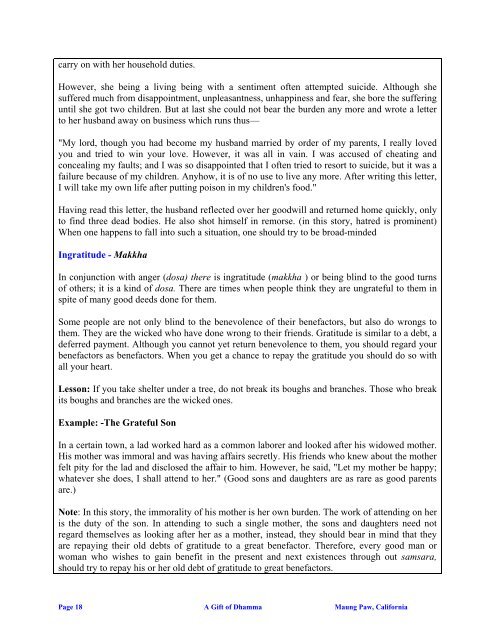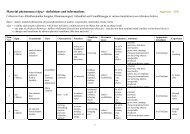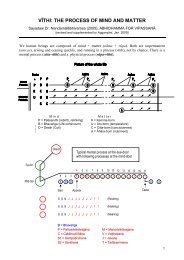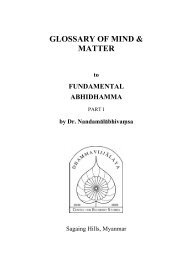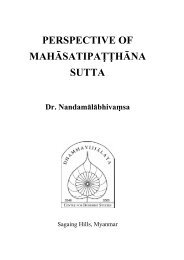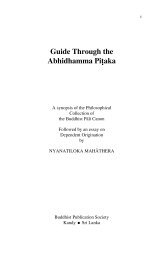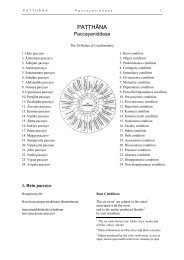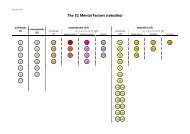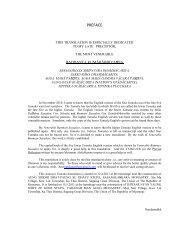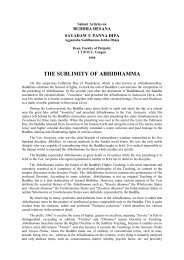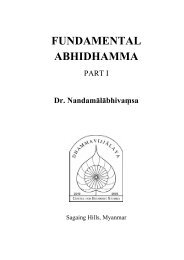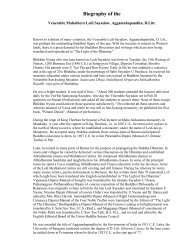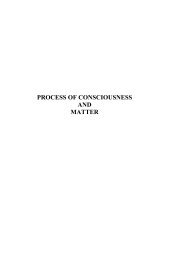ABHIDHAMMA IN DAILY LIFE - Abhidhamma.com
ABHIDHAMMA IN DAILY LIFE - Abhidhamma.com
ABHIDHAMMA IN DAILY LIFE - Abhidhamma.com
Create successful ePaper yourself
Turn your PDF publications into a flip-book with our unique Google optimized e-Paper software.
carry on with her household duties.<br />
However, she being a living being with a sentiment often attempted suicide. Although she<br />
suffered much from disappointment, unpleasantness, unhappiness and fear, she bore the suffering<br />
until she got two children. But at last she could not bear the burden any more and wrote a letter<br />
to her husband away on business which runs thus—<br />
"My lord, though you had be<strong>com</strong>e my husband married by order of my parents, I really loved<br />
you and tried to win your love. However, it was all in vain. I was accused of cheating and<br />
concealing my faults; and I was so disappointed that I often tried to resort to suicide, but it was a<br />
failure because of my children. Anyhow, it is of no use to live any more. After writing this letter,<br />
I will take my own life after putting poison in my children's food."<br />
Having read this letter, the husband reflected over her goodwill and returned home quickly, only<br />
to find three dead bodies. He also shot himself in remorse. (in this story, hatred is prominent)<br />
When one happens to fall into such a situation, one should try to be broad-minded and treat<br />
Ingratitude - Makkha<br />
In conjunction with anger (dosa) there is ingratitude (makkha ) or being blind to the good turns<br />
of others; it is a kind of dosa. There are times when people think they are ungrateful to them in<br />
spite of many good deeds done for them.<br />
Some people are not only blind to the benevolence of their benefactors, but also do wrongs to<br />
them. They are the wicked who have done wrong to their friends. Gratitude is similar to a debt, a<br />
deferred payment. Although you cannot yet return benevolence to them, you should regard your<br />
benefactors as benefactors. When you get a chance to repay the gratitude you should do so with<br />
all your heart.<br />
Lesson: If you take shelter under a tree, do not break its boughs and branches. Those who break<br />
its boughs and branches are the wicked ones.<br />
Example: -The Grateful Son<br />
In a certain town, a lad worked hard as a <strong>com</strong>mon laborer and looked after his widowed mother.<br />
His mother was immoral and was having affairs secretly. His friends who knew about the mother<br />
felt pity for the lad and disclosed the affair to him. However, he said, "Let my mother be happy;<br />
whatever she does, I shall attend to her." (Good sons and daughters are as rare as good parents<br />
are.)<br />
Note: In this story, the immorality of his mother is her own burden. The work of attending on her<br />
is the duty of the son. In attending to such a single mother, the sons and daughters need not<br />
regard themselves as looking after her as a mother, instead, they should bear in mind that they<br />
are repaying their old debts of gratitude to a great benefactor. Therefore, every good man or<br />
woman who wishes to gain benefit in the present and next existences through out samsara,<br />
should try to repay his or her old debt of gratitude to great benefactors.<br />
Page 18 A Gift of Dhamma Maung Paw, California


